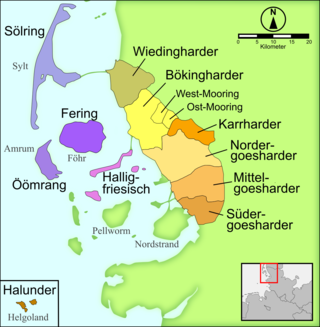Top Qs
Timeline
Chat
Perspective
Halligen Frisian
Mainland North Frisian dialect From Wikipedia, the free encyclopedia
Remove ads
Halligen Frisian (North Frisian: Halifreesk) is the dialect of the North Frisian language spoken on the Halligen islands, primarily Langeneß and Hooge, in the German region of North Frisia. The dialect has survived despite the islands being home to less than 300 people and unprotected by dikes, mandating evacuations during storms. However, it is now in danger of extinction.[2] Although it is spoken on islands, it is considered part of the Mainland North Frisian dialects as opposed to the Insular North Frisian Dialects, due to its linguistic features.[3]
Remove ads
Grammar
Verbs
Below are six commonly used verbs in Halligen Frisian:
- The future tense is formed with the verbs wal or skal.
- The perfect tense is formed with either hääw or weese.
Remove ads
References
Further reading
External links
Wikiwand - on
Seamless Wikipedia browsing. On steroids.
Remove ads

